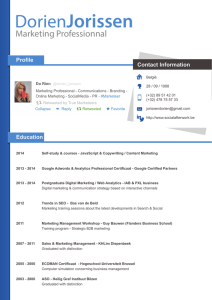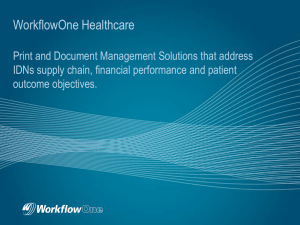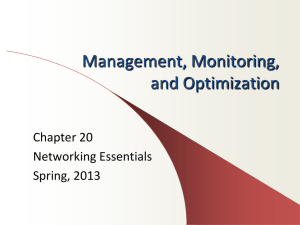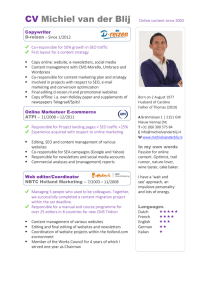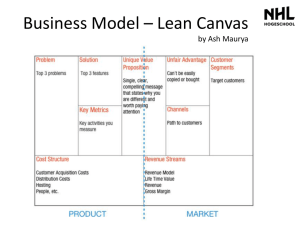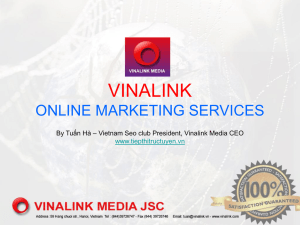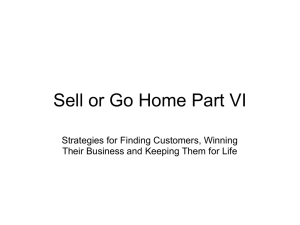1:00 PM
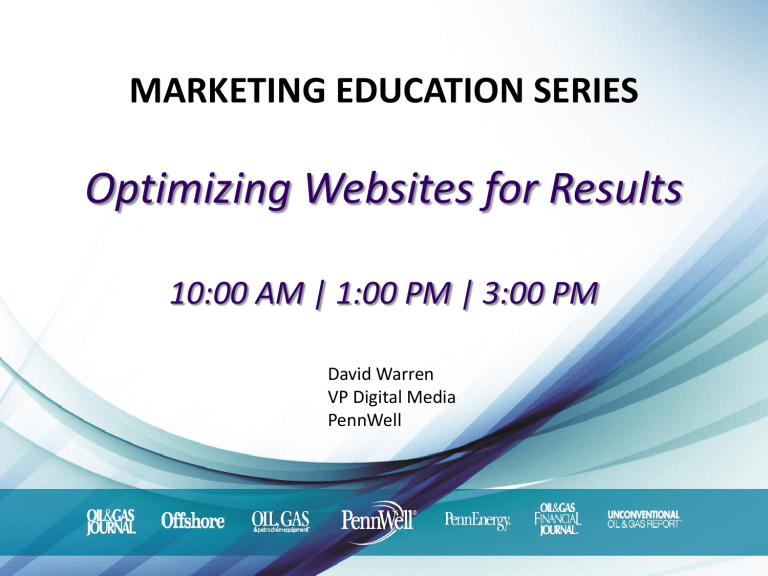
MARKETING EDUCATION SERIES
Optimizing Websites for Results
10:00 AM | 1:00 PM | 3:00 PM
David Warren
VP Digital Media
PennWell
Objective and Scope Of this Talk
• Objective: To help you (marketers) make the most effective use of your websites and deliver desired outcomes
• Scope: On-site optimization is the realm we are exploring
– Not social, SEM, SEO (much), advertising, etc.
B2B Marketers are Investing in Websites
Your Website is Your Marketing Hub
Graphic source: Circle S Studios
Top 15 Tips for Website Optimization
1.
Prioritize goals and align with marketing strategy
2.
Establish KPI’s and review & report processes
3.
Analyze and fix bounces & abandonment
4.
Measure and improve conversion rates
5.
Develop a content strategy
6.
Map content to customer lifecycle
7.
Do a content audit
8.
Operate a company blog
9.
Do the SEO basics well
10. Also spend time on technical SEO
11. Improve usability through user feedback sessions
12. Make your pages fast
13. Use automated testing tools to pptimize the key points
14. Optimize for mobile with responsive or adaptive design
15. Use a style guide
1.Be clear on what you are trying to achieve
Branding
Thought Leadership
Lead Generation
Cost
Reduction/Avoidance
Direct Sales
Prioritize and align with your firm’s marketing strategy
2. Set Key Performance Indicators (KPIs)
• Conversion Rates
• Lead Generation Rates
• E-commerce Sales
• Attributable Sales
• Average Order Size
• Leads Generated
• Reach (Unique visitors)
• Engagement (ToS, Visit
Depth)
• Revisit Rate
• Repurchase rate
Establish a regular site reporting and review process
3. Spend Quality Time with your Web
Analytics Tool on these Metrics:
• Bounce Rate
– Helps you identify campaigns where you might be targeting the wrong people, have ineffective landing pages, or even technical problems.
• Abandonment in checkout or registration paths
– Fix the holes in your funnel!
4. Focus on Improving Conversions
• Definitions:
– Commonly used: The % web site visitors who take a specific action
– How we measure it: The web site visits that result in a desired action as a % of the visits that could have resulted in that action
• Types of conversions
– Conversions to leads
– “Soft” or attributable conversions
– Downloads or views of particular materials
4. Steps to Maximize Conversion
Rates
1.
Use dedicated landing pages customized to each campaign
2.
Fix the holes in your funnel! Measure and improve on an ongoing basis.
3.
Anticipate and answer visitor concerns throughout the conversion process
1.
Offer clear guarantees for products and privacy
2.
Utilize “social proof” such as testimonials
3.
Establish credibility by displaying trust seals
4.
Don’t make the user think – it should be easy to do
1.
Avoid multiple calls to action
2.
Use lots of product images
3.
Declutter, use lots of whitespace
How Well Will this Site Convert?
How Well Will this Site Convert?
How Well Will this Site Convert?
How Well Will this Site Convert?
How Well Will this Site Convert?
5. Develop a Content Strategy
6. Map Content to the Customer Lifecycle
7. Start With a Simple Content Audit
8. Operate a Company Blog
The average company that blogs has:
9. Optimize for SEO, do the Basics
1.
2.
Put real effort into keyword choices and analysis.
Keywords tie back to and inform content strategy
Making your content easily shareable to build links
3.
4.
Setup and use Google Webmaster Tools
Review sites that rank higher on key search terms and adapt http://www.searchenginejournal.com/12-basic-on-site-seo-tactics-for-optimized-results/5966/
10. Optimize for SEO, Cover the
Technical Basics
1. The page title tag, it’s #1 for a reason
2. H1 and H2 text
3. Keyword density and location in body text
4. Meta description & keywords
5. URL structure and length
6. Image title and Alt tags
7. Internal link structure
8. Create XML site map http://www.searchenginejournal.com/12-basic-on-site-seo-tactics-for-optimized-results/5966/
11. Get Direct User Feedback to Improve
Usability
• Don’t be afraid to grab a few people from accounting or HR to help you test, although ideally it would be from your target user group
• Keep the tests simple, its fine just to give them a few tasks and watch over their shoulders
• You can learn a lot from just 5 people on a given scenario, 10 users will typically give you 90% of what you need to know
• Use online tools such as usertesting.com
12. Improve Page Load Speed
Nearly 60% of users will abandon if they have to wait more than 3 seconds
1. Optimize your images
2. Optimize your HTML
3. Reduce the # of requests
4. Use text instead of images where feasible
5. Use a CDN (Content Delivery Network such as
Akamai or Limelight
6. Use caching features of your CMS
7. Look for 404 and other errors in your analytics tool and fix http://www.slideshare.net/dnnsoftware/10-website-optimization-tips-26285665
13. Test, Test, Test
• Use automated tools to test offers images, calls to action, and any other web site variable
• It’s possible to very easily do
A/B and multivariate testing with only a few hours work
• Ideal for key conversion points
• Examples of testing tools are
Adobe Test & Target, Google
Web Site Optimizer, Maxymiser and Optimizely
14. Optimize for Mobile with
Responsive / Adaptive Design
15. Create a Style Guide
• Ensures a consistent brand image throughout your web site(s).
• Explains the proper visual usage of a company’s logo, colors, fonts and tagline etc.
• Provides instructions on the companies “tone of voice”, brand colors, typography, logo treatment, etc.
Summary: Top 15 Tips for Website
Optimization
1.
Prioritize goals and align with marketing strategy
2.
Establish KPI’s and review & report processes
3.
Analyze and fix bounces & abandonment
4.
Measure and improve conversion rates
5.
Develop a content strategy
6.
Map content to customer lifecycle
7.
Do a content audit
8.
Operate a company blog
9.
Do the SEO basics well
10. Also spend time on technical SEO
11. Improve usability through user feedback sessions
12. Make your pages fast
13. Use automated testing tools to pptimize the key points
14. Optimize for mobile with responsive or adaptive design
15. Use a style guide
Thanks for your time and attention!
David Warren
VP Digital Media
PennWell
Connect with me on Twitter or LinkedIn:
@davidlwarren http://www.linkedin.com/in/davidlwarren dwarren@pennwell.com
Questions?
Bonus: Lead Generation
• Some newer lead gen technologies that enable you to observe "anonymous" visitors to your site (Visistat, Demandbase, using reverse IP lookup and other), perfect fodder for an inside rep to call and qualify
• Lead gen follow up processes, integrations into
CRM.
• Forms tools such as WuFoo, Extreme Forms
• Lead nurturing with tools from Act-On,
Marketo
MARKETING EDUCATION SERIES
Using Social Media to Promote your Tradeshow Presence
10:00 AM | 1:00 PM | 3:00 PM
Carrie Gardenhire
Director of Digital Marketing
PennWell
